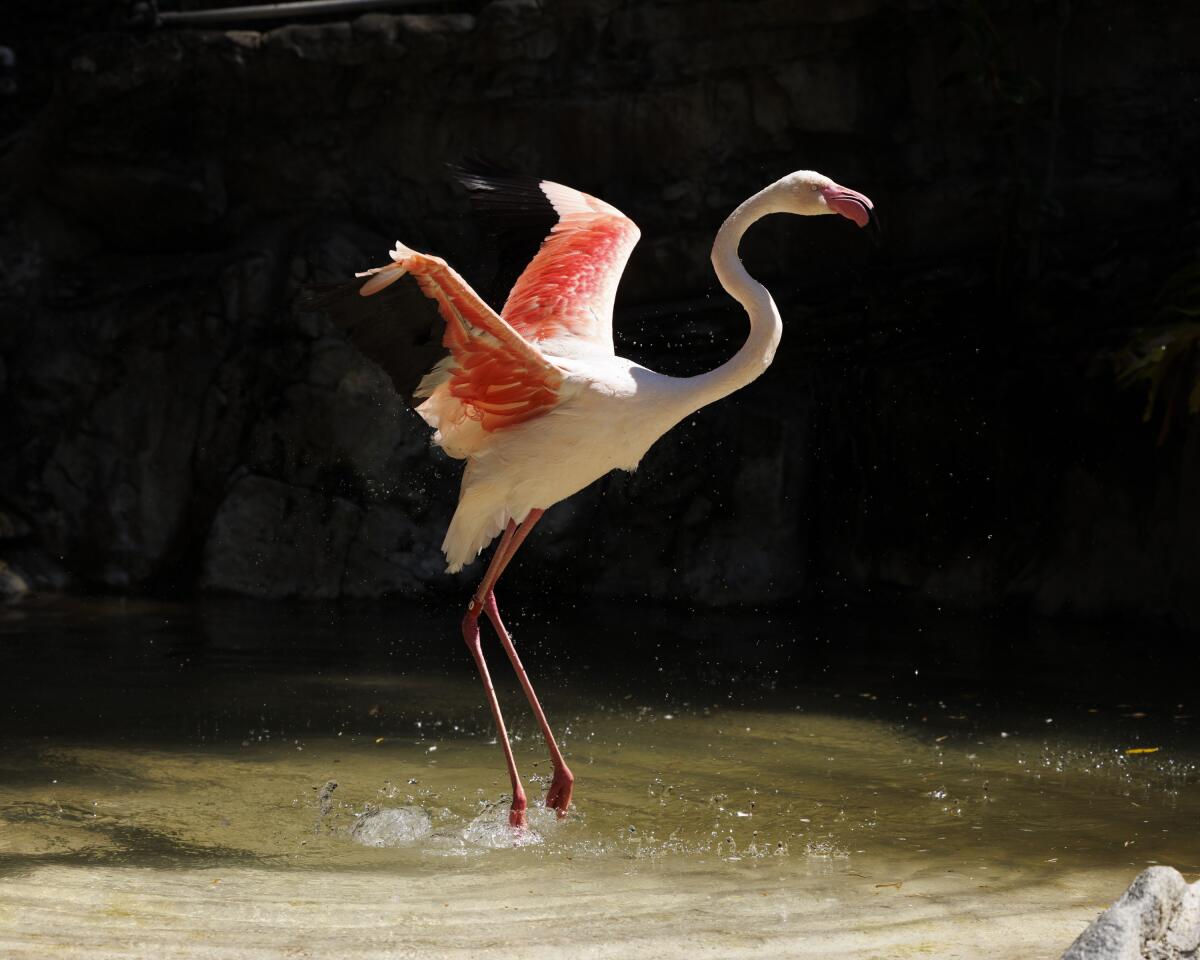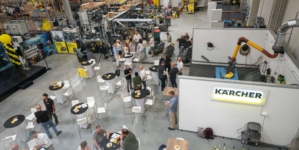-
Common Belief About Left-Handed People Debunked by Psychologists - 24 mins ago
-
Tesla stock price sinks as Musk and Trump feud over spending bill - 34 mins ago
-
2025 Gold Cup Odds: Mexico Slightly Favored Over U.S. Ahead Of Semifinals - 42 mins ago
-
Court in Thailand suspends prime minister over leaked phone call with Cambodian official - 47 mins ago
-
Woman Wonders Why Senior Dog Lies in One Spot—Then Has Tearful Realization - about 1 hour ago
-
From Pure Flavors to Bold Innovations - about 1 hour ago
-
Real Madrid vs. Juventus: Preview, odds, how to watch, time - about 1 hour ago
-
SparkKitty mobile malware targets Android and iPhone - about 1 hour ago
-
Jessica Pegula loses in first round upset at Wimbledon - 2 hours ago
-
Woman Sees Stray Cat in Yard, Husband Discovers Her Elaborate Safety Plan - 2 hours ago
Inside the L.A. Zoo’s messy $50-million breakup
In 2022, Robert Ellis pledged $200,000 to create a garden in the Los Angeles Zoo’s bird theater.
By January, the city of Los Angeles had sued its nonprofit partner, the Greater Los Angeles Zoo Assn., amid longstanding tensions over spending and other issues.
Ellis, a GLAZA board member, redirected his donation to a fund for the nonprofit’s legal fees.
At stake in the messy divorce between the city and the association is a nearly $50-million endowment that each side claims is theirs and that funds much of the zoo’s special projects, capital improvements and exhibit construction.
The city’s contract with GLAZA, which governs fundraising, special events and more, ends Tuesday, leaving the zoo in a precarious place, with no firm plan for how to proceed.
The elephant exhibit is empty after the last two Asian elephants, Billy and Tina, were transferred to the Tulsa Zoo.
(Carlin Stiehl / Los Angeles Times)
The zoo, which houses more than 1,600 animals, has become increasingly dilapidated. Exhibits including the lions, bears, sea lions and pelicans have closed because they need major renovations. The last two elephants, Billy and Tina, recently departed for the Tulsa Zoo after decades of campaigning by animal rights advocates over living conditions and a history of deaths and health challenges.
The 59-year-old zoo, which occupies 133 acres in the northeast corner of Griffith Park, is struggling to maintain its national accreditation, with federal regulators finding peeling paint and rust in some exhibits.
U.S. Department of Agriculture inspectors and the Assn. of Zoos and Aquariums found a “critical lack of funding and staffing to address even the most basic repairs,” L.A. Zoo officials wrote in a budget document in November 2024.

A sign designating a closed exhibit is posted in an animal enclosure at the Los Angeles Zoo.
(Carlin Stiehl / Los Angeles Times)
Meanwhile, attendance has declined to a projected 1.5 million visitors in 2024-25, down about 100,000 from the previous year, the zoo said, citing “outdated infrastructure” and closed exhibits as part of the reason.
“We’re not vibrant like we should be,” said Karen Winnick, president of the city Board of Zoo Commissioners.
GLAZA has been the zoo’s main partner since it opened in 1966, handling fundraising, special events, membership, publications, volunteers and sponsorship.
The zoo’s $31-million operating budget comes largely from tickets and other sources, with only 1% to 2% directly from the association, according to City Administrative Officer Matt Szabo.
But the indirect amount is higher, since GLAZA raises money through membership and special events, depositing some of it in a fund that covers most of the zoo’s budget.
Outside of the operating budget, the group also raises money for facility renovations and programs such as animal care, conservation and education.
Through a spokesperson, Ellis and other GLAZA board members declined to comment.
Devin Donahue, a lawyer for GLAZA, said in a statement that the nonprofit “spent more than 60 years building up an eight-figure endowment that the City of Los Angeles is now attempting to seize without concern for the intent of the donors who chose to give to a trusted charity, and not to a city running a billion-dollar deficit. To remove GLAZA’s safeguarding hand from Zoo funding would be catastrophic for both the LA Zoo and its animals.”

A flamingo basks in water at the Los Angeles Zoo.
(Carlin Stiehl / Los Angeles Times)
One GLAZA insider blamed the conflicts on Zoo Director and CEO Denise Verret, saying she has tried to take power away from the association since she assumed the role in 2019.
Another source familiar with the relationship said that zoo officials believe they don’t need GLAZA and have wanted to end the partnership for years.
“They [the city] believe they could do this on their own,” said the second source, who was granted anonymity to speak candidly about the partnership amid the ongoing litigation. “There’s a lot of animosity, as opposed to it being a healthy relationship or one of gratitude.”
The relationship between the zoo and GLAZA has been fraught for decades, stemming from issues regarding money and power, said Manuel Mollinedo, who was zoo director from 1995 to 2002.
“They would make the zoo literally beg for money,” Mollinedo said. “The problem with GLAZA is they see themselves as an entity only responsible in answering to themselves. They don’t see themselves as an organization there to support and work with the zoo.”
Mollinedo said he always thought the zoo would be better off taking some power away from GLAZA and instead partnering with different organizations.
GLAZA has accused the zoo of not properly spending the money that the association raises.
“Notwithstanding red flag warnings of disrepair at the Zoo, enclosure and exhibit closures, and troubling risks to the health and safety of the Zoo’s animals, the City has failed to spend money raised by GLAZA and available to it for necessary remediation,” the nonprofit said in court papers.
In 2023, more than 20 years after Mollinedo left the zoo, city officials announced that they would open up “requests for proposals” for organizations interested in performing GLAZA’s functions, in what they described as an effort to promote fairness and transparency and ensure that the zoo was getting the best services.
By initiating the application process, the city showed that it had no interest in continuing its “overarching partnership” with the organization, Erika Aronson Stern, chair of the GLAZA Board of Trustees, said in a letter to Mayor Karen Bass in October.
GLAZA declined to apply and announced that it would be walking away, along with its nearly $50-million endowment.

A giraffe watches as people pass by its enclosure at the Los Angeles Zoo.
(Carlin Stiehl / Los Angeles Times)
Some of the endowment money still needed to spent on the zoo, according to donors’ wishes, and GLAZA would transfer that money to the facility — but it refused to cede control of the fund.
Late last year, the city sued the association, arguing that it was the rightful owner of the endowment.
“GLAZA has only been permitted to raise funds on behalf of the City, never on its own exclusive behalf,” wrote Deputy City Atty. Steven Son.
GLAZA said it does have the right to raise funds for itself and asserted that the city has been mismanaging zoo money for years.

Los Angeles Zoo Director Denise Verret stands in front of an area of the zoo slated for redevelopment. The 20-acre expansion would include a new hilltop Yosemite lodge-style California Visitor Center with sweeping views of a 25,000- square-foot vineyard.
(Mel Melcon / Los Angeles Times)
Verret, the zoo’s director, spent exorbitant amounts on activities unrelated to the zoo, GLAZA alleged in court documents, including $22,000 on a party celebrating her own appointment in 2019, $13,000 improving her office and $14,000 on the assistant director’s office.
The association also said in court documents that it provided at least $1.7 million at Verret’s request for conservation organizations that are “separate and distinct” from the zoo.
Verret argued in court papers that her use of the money was appropriate. She modernized “1960s-era” administrative offices, and her welcome party helped “strengthen relationships.” Conservation is one of the zoo’s “core purposes,” she said, noting that GLAZA didn’t raise the spending questions until after the city sued.
In a statement, Verret said the zoo is prepared to be on the international stage for the Summer Olympics in 2028.
“With the new structure and … new business partners in place, the L.A. Zoo is in a very healthy place now and continues to focus on its mission,” she said.
As for fundraising, she was less clear.
“Although we are still developing plans to establish a new fundraising model, we are future-focused with our priorities and efforts grounded in the gold-standard care and well-being for the animals at the zoo,” she said.
On Wednesday, a judge ruled that GLAZA cannot solicit donations “that are not for the exclusive benefit of the Los Angeles Zoo” and may not use funds from the endowment without the city’s permission. The question of who controls the endowment is still open.
Donahue, the GLAZA lawyer, called the judge’s ruling “wrong on the law and facts, deeply flawed analytically and not in the best interest of the Zoo, its animals, its donors, or the people of Los Angeles.” He said was confident that an appellate court would reach a different decision.
As the lawsuit moves forward, the City Council is working to approve new contracts with other organizations to handle concessions, memberships and other functions. City employees perform many core jobs, such as feeding and caring for the animals, but volunteers supplied by GLAZA, including the docents that gave tours, played a major role in the zoo’s day-to-day operations.
“It’s really a shame that it has devolved to this point,” said Ron Galperin, a former city controller who conducted a special review of the relationship between the nonprofit and the zoo in 2018 and found it “cumbersome and confusing.”
Galperin has advocated for the zoo to be run as a public-private partnership, with the city leasing the land and animals to an organization like GLAZA that would run it, similar to the Los Angeles County Museum of Art or the Hollywood Bowl.
The city previously explored that option after the 2008 financial crisis, but it was opposed by unions that represent zoo workers, as well as by animal rights activists who believed there would be less transparency surrounding the care of the animals.
About 73% of accredited zoos are managed by non-government entities — 57% by nonprofits and 16% by for-profit organizations, according to a study by the Assn. of Zoos and Aquariums.
Winnick, the Zoo Commission president, believes a privately run zoo would raise funds more effectively and save the city money.
“We need new governance for our zoo, and this is the time to do it, with our city overwhelmed by so many problems,” she said. “It would serve people of L.A. and the community for us to go into public-private partnership.”
Instead, the city will run the zoo piecemeal, with at least two organizations taking over what GLAZA once did.
The city recently came to an agreement with SSA Group, LLC to run membership, special events and publications, while The Superlative Group will run sponsorship programs. The city plans to manage volunteers itself.
But the zoo still has not found a fundraising partner.
“For the city to lose a fundraising partner at this point in time, with the deficit we have and visitors we’re expecting to L.A., is sad,” said Richard Lichtenstein, a former member of the GLAZA board and a former zoo commissioner, who said he was speaking as an individual and not on behalf of the association.
“The city does deserve, and its residents deserve, a first-class facility, and without a funding partner, it is difficult to see how the zoo is going to be able to maintain itself as a world-class facility,” he said.
Source link































